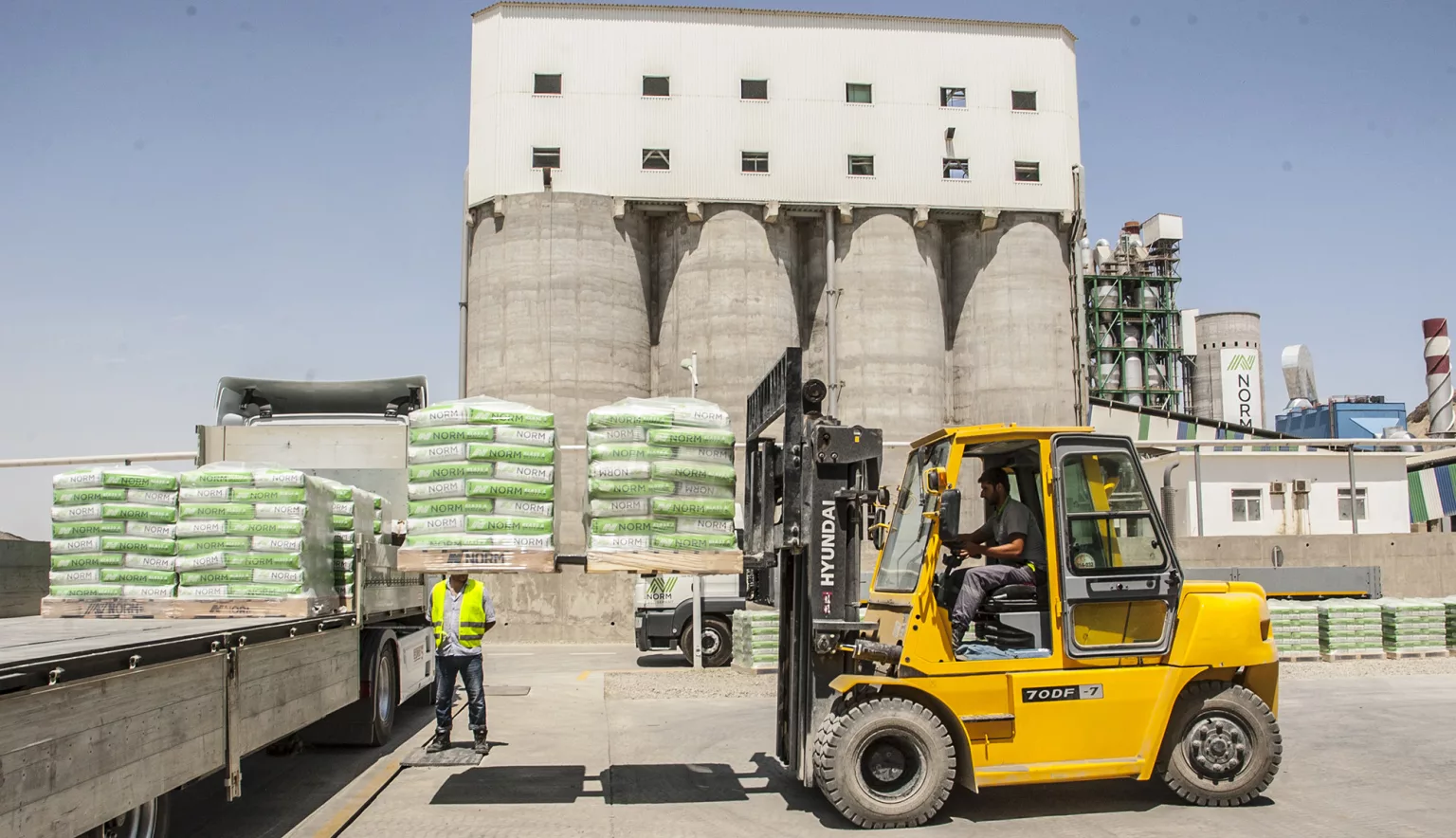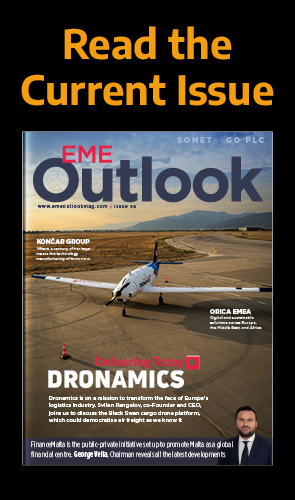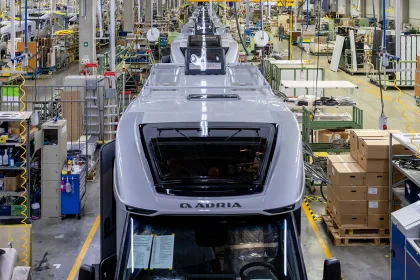Norm LLC, the largest cement producer in the South Caucasus, is facilitating cement-empowered economic diversification for both Azerbaijan and the wider region. Henning Sasse tells its story.
LAYING THE FOUNDATIONS FOR CHANGE
Azerbaijan has historically been an energy-led economy.
Less industrially developed than neighbours Armenia and Georgia throughout the Soviet period, the country’s oil boom during the nineties and noughties saw its GDP growth rates skyrocket year after year, peaking at 34.6 percent in 2006.
In more recent years, however, the government has recognised that its reliance on energy exports has to change, the country resultantly focussing on economic reform and sustainable macroeconomic stabilisation.
Under this renewed strategy, the construction industry has excelled. According to annual numbers from the State Statistical Committee of Azerbaijan, the sector now accounts for 44.2 percent of GDP (based on 2018’s figures), up from 32.9 percent in 2015.
Norm LLC has thrived in this environment, which has become indispensable to the continued development of the non-oil sector.
“The construction industry in Azerbaijan has become one of the fastest growing verticals of today, now firmly a key driving force behind the country’s economic development,” affirms Henning Sasse, the organisation’s CEO.
“Considering this context, there was a growing demand for and indeed need for investments into cement production. It was this that stimulated Norm LLC to launch the Norm Sement plant project, now one of the largest non-oil sector entities and a key facilitator of social and economic benefit.”
INSTIGATING INNOVATION
Such a reputation has been established in the space of just half a decade, owed to the company’s willingness to proactively remain ahead of the curve and underpinned by its emphasis on revolutionary technologies.
“The Norm Sement plant was designed to incorporate some of the most advanced European technologies from the outset,” Sasse reveals. “On the production side, we have installed machinery including a crusher, vertical roller miller, burner, cooler and more, sourcing industry leading equipment from the likes of HAZEMAG, Gebr, Pfeiffer SE, Pillard, Claudius Peters Ltd, Siemens, Haver & Boecker and Phillips.
“Leveraging the cutting-edge ensures that high quality of output, safety and efficiency of operations and minimisation of fuel and power consumption are maintained, all while preserving the most stringent of European and global ecological standards.”
This ethos and its accompanying investment commitments have resultantly seen the creation of the first concrete laboratory in Azerbaijan, allowing Norm to provide unrivalled professional and technical services. Meanwhile, the company has more recently been developing a new silo costing $6.5 million that will enable it to supply special cements to its customers and widen its product portfolio, pending completion later this year.
Further, the company is equally anticipating that it will become the first firm in Azerbaijan to bring API-certified oil well cement to the national industry from 2020 onwards.
“Equipment aside, we also held the inaugural international conference for Azerbaijan’s concrete industry in partnership with International CPI Worldwide journal and International Concrete Conference and Exhibition (ICCX) Academy, looking at modern concrete technologies and the country’s construction directions,” Sasse continues.
“We have been working towards our own personal international ambitions as well. Consolidating our position through several years of production experience has allowed us to access new markets and expand our reach. We’ve been exporting cement and clinker products to neighbouring Georgia for some years, for example.”
COLLABORATION IS CRUCIAL
A nous for technology and eye to investment are not the sole reasons behind the firm’s ability to continually raise Azerbaijan’s profile on the global construction map, however, the Chief Executive equally pointing to Norm’s network of esteemed suppliers.
“These relationships are crucial to the success of the business,” Sasse reveals.
“The better we know our suppliers, and the better they know us, the more likely we are to benefit from dedicated service, preferential pricing and special terms. Our supply chain has become more efficient, cost-effective and productive, essentially creating key advantages and better value for the business.”
Likewise, the company’s largely local workforce contributes immensely – something that is not lost on the company.
Sasse continues: “We try to ensure that there’s a win-win relationship with each and every employee, running a special programme aimed at enhancing the skillsets of our workers to this end, named MWFT – Manufacturing Workforce Training.”
This is accompanied by Norm Ustalar Klubu (Norm Club of Masters), an alternate awareness-raising training programme, bringing industry professionals together to share knowledge and insights. Initially launched in December 2016, over 44 Norm Ustalar Klubu events have been run across different areas of the republic to date, receiving an average attendance of 1,500.
“We’re planning to unite the club around a virtual network using advanced software in the future,” Sasse adds. “By doing so, industry operators will be able to benefit from shared
attitudes for quality and professional services, gaining the ability to find experts in any field and removing a multitude of pain points.”
ONWARD OPTIMISM
Coupling these community-focussed efforts with Norm’s charitable initiatives, regularly supporting disabled children and the homeless youth in various ways, it’s clear that the company is seeking to make a real industrial, economic and social difference.
Confident that these forward-thinking, inclusive attitudes will remain the driving force behind the enterprise’s overriding success for years to come, Sasse is optimistic for the future despite a recent downturn in fortunes.
“For the time being, cement demand in Azerbaijan is stagnating, putting pressure on our margins,” he explains. “But this won’t block our ambitions. Our priorities are to enter into new business activities both inside and outside of the country, and we’ll be focusing on further optimising our existing operations in order to sustain profitability.
“In the long run, we are definitely positive about our prospects. In Azerbaijan, further investments in infrastructure are required to develop its economy, which should support local cement demand.”
Sustained market prosperity aside, the CEO equally highlights an alternate set of ambitions that will take precedence moving forward, the firm becoming increasingly conscious of its impact on the environment.
“We cannot ignore the fact that the cement industry is one of the main sources of CO2 emissions,” Sasse states consciously, highlighting how the company can lessen its environment impact.
“We’re aware that we have to take steps to reduce our carbon footprint and help mitigate the risks from global climate change, something that will begin to come to fruition once the ongoing development of our credible decarbonisation strategy is complete.
“We already monitor our greenhouse gas emissions and we’re working to create new clinker and cement types connected with carbon capture, utilisation and storage technologies. Integrating these into our overall manufacturing processes will become a priority during the coming months and years.”



































